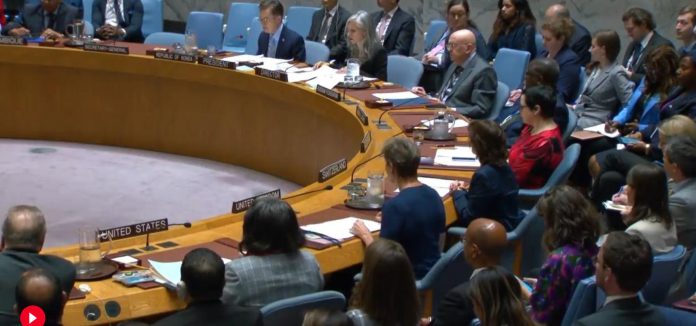AP — The U.N. Security Council on Monday approved its first resolution endorsing a cease-fire plan aimed at ending the eight-month war between Israel and Hamas in Gaza.
The U.S.-sponsored resolution welcomes a cease-fire proposal announced by President Joe Biden that the United States says Israel has accepted. It calls on the militant Palestinian group Hamas, which initially said it viewed the proposal “positively,” to accept the three-phase plan.
Hamas responded to the adoption by saying it welcomed the resolution and was ready to work with mediators in indirect negotiations with Israel to implement it. The statement was among the strongest from Hamas to date but stressed the group would continue “our struggle” to end the Israeli occupation and work on setting up a “fully sovereign” Palestinian state.
The resolution — which was approved overwhelmingly with 14 of the 15 Security Council members voting in favor and Russia abstaining — calls on Israel and Hamas “to fully implement its terms without delay and without condition.”
U.S. Ambassdador Linda Thomas-Greenfield said after the vote the council “sent a clear message to Hamas to accept the cease-fire deal on the table,” reiterating that Israel has accepted the deal which is supported by countries across the world.
“The fighting could stop today, if Hamas would do the same,” she told the council. “I repeat, this fighting could stop today.”
U.S. deputy ambassador Robert Wood told reporters earlier on Monday that the United States wanted all 15 Security Council members to support what he described as “the best, most realistic opportunity to bring at least a temporary halt to this war.”
Whether Israel and Hamas agree to the three-phase cease-fire plan remains in question, but the resolution’s strong support in the U.N.’s most powerful body puts added pressure on both parties to approve the proposal.
Israeli Prime Minister Benjamin Netanyahu has said that Biden presented only parts of the proposal and insisted that any talk of a permanent cease-fire before dismantling Hamas’ military and governing capabilities is a nonstarter.
Earlier Monday, Hamas and Palestinian Islamic Jihad leaders met in Qatar to discuss the proposed cease-fire deal and said later that any deal must lead to a permanent cease-fire, a full Israeli withdrawal from the Gaza Strip, an end to the Israeli siege of Gaza, reconstruction and “a serious exchange deal” between hostages in Gaza and Palestinians held in Israeli jails.
Algeria’s U.N. Ambassador Amar Bendjama, the Arab representative on the council, said that while the text isn’t perfect, “it offers a glimmer of hope to the Palestinians, as the alternative is (the) continuing killing and suffering of the Palestinian people.”
“We voted for this text to give diplomacy a chance to reach an agreement that will end the aggression against the Palestinian people that has lasted far too long,” Bendjama said.
The war was sparked by Hamas’ surprise Oct. 7 attack in southern Israel that killed about 1,200 people, mainly Israeli civilians, and saw about 250 others taken hostage. About 120 hostages remain, with 43 pronounced dead.
Israel’s military offensive has killed more than 36,700 Palestinians and wounded in excess of 83,000 others, according to the Gaza Health Ministry. It has also destroyed about 80% of Gaza’s buildings, according to the U.N.
The Security Council adopted a resolution on March 25 demanding a humanitarian cease-fire in Gaza during the Muslim holy month of Ramadan, with the U.S. abstaining, but there was no halt to the war.
Monday’s resolution underscores “the importance of the ongoing diplomatic efforts by Egypt, Qatar and the United States aimed at reaching a comprehensive cease-fire deal, consisting of three phases.” It comes as U.S. Secretary of State Antony Blinken is on his eighth trip to the Middle East since Oct. 7 pursuing that goal.
Biden’s May 31 announcement of the new proposal said it would begin with an initial six-month cease-fire with the release of hostages in exchange for Palestinian prisoners, the withdrawal of Israeli forces from populated areas in Gaza and the return of Palestinian civilians to all areas in the territory.
Phase one also requires the safe distribution of humanitarian assistance “at scale throughout the Gaza Strip,” which Biden said would lead to 600 trucks with aid entering Gaza every day.
In phase two, the resolution says that with the agreement of Israel and Hamas, “a permanent end to hostilities, in exchange for the release of all other hostages still in Gaza, and a full withdrawal of Israeli forces from Gaza” will take place.
Phase three would launch “a major multi-year reconstruction plan for Gaza and the return of the remains of any deceased hostages still in Gaza to their families.”
The resolution reiterates the Security Council’s “unwavering commitment to achieving the vision of a negotiated two-state solution where two democratic states, Israel and Palestine, live side by side in peace within secure and recognized borders.”
It also stresses “the importance of unifying the Gaza Strip with the West Bank under the Palestinian Authority,” something Netanyahu’s right-wing government has not agreed to.






